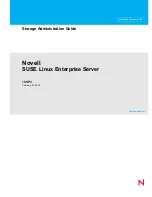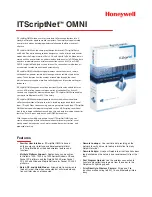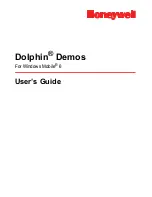
6
SLES 10 SP3: Storage Administration Guide
no
vd
ocx
(e
n)
7 Ja
nua
ry 201
0
4.4
Creating Disk Segments (or Partitions) . . . . . . . . . . . . . . . . . . . . . . . . . . . . . . . . . . . . . . . . . . 38
4.5
Configuring Mount Options for Devices . . . . . . . . . . . . . . . . . . . . . . . . . . . . . . . . . . . . . . . . . . 39
4.6
What’s Next . . . . . . . . . . . . . . . . . . . . . . . . . . . . . . . . . . . . . . . . . . . . . . . . . . . . . . . . . . . . . . . 41
5 Managing Multipath I/O for Devices
43
5.1
Understanding Multipathing . . . . . . . . . . . . . . . . . . . . . . . . . . . . . . . . . . . . . . . . . . . . . . . . . . . 43
5.1.1
What Is Multipathing? . . . . . . . . . . . . . . . . . . . . . . . . . . . . . . . . . . . . . . . . . . . . . . . . 43
5.1.2
Benefits of Multipathing . . . . . . . . . . . . . . . . . . . . . . . . . . . . . . . . . . . . . . . . . . . . . . . 43
5.2
Planning for Multipathing . . . . . . . . . . . . . . . . . . . . . . . . . . . . . . . . . . . . . . . . . . . . . . . . . . . . . 44
5.2.1
Guidelines for Multipathing . . . . . . . . . . . . . . . . . . . . . . . . . . . . . . . . . . . . . . . . . . . . 44
5.2.2
Using Multipathed Devices Directly or in EVMS . . . . . . . . . . . . . . . . . . . . . . . . . . . . 45
5.2.3
Using LVM2 on Multipath Devices. . . . . . . . . . . . . . . . . . . . . . . . . . . . . . . . . . . . . . . 46
5.2.4
Using mdadm with Multipath Devices . . . . . . . . . . . . . . . . . . . . . . . . . . . . . . . . . . . . 46
5.2.5
Using --noflush with Multipath Devices . . . . . . . . . . . . . . . . . . . . . . . . . . . . . . . . . . . 46
5.2.6
Partitioning Multipath Devices . . . . . . . . . . . . . . . . . . . . . . . . . . . . . . . . . . . . . . . . . . 46
5.2.7
Supported Architectures for Multipath I/O . . . . . . . . . . . . . . . . . . . . . . . . . . . . . . . . . 47
5.2.8
Supported Storage Arrays for Multipathing . . . . . . . . . . . . . . . . . . . . . . . . . . . . . . . . 47
5.3
Multipath Management Tools. . . . . . . . . . . . . . . . . . . . . . . . . . . . . . . . . . . . . . . . . . . . . . . . . . 49
5.3.1
Device Mapper Multipath Module . . . . . . . . . . . . . . . . . . . . . . . . . . . . . . . . . . . . . . . 49
5.3.2
Multipath I/O Management Tools. . . . . . . . . . . . . . . . . . . . . . . . . . . . . . . . . . . . . . . . 51
5.3.3
Using mdadm for Multipathed Devices . . . . . . . . . . . . . . . . . . . . . . . . . . . . . . . . . . . 52
5.3.4
The Linux multipath(8) Command . . . . . . . . . . . . . . . . . . . . . . . . . . . . . . . . . . . . . . . 52
5.4
Configuring the System for Multipathing . . . . . . . . . . . . . . . . . . . . . . . . . . . . . . . . . . . . . . . . . 53
5.4.1
Preparing SAN Devices for Multipathing . . . . . . . . . . . . . . . . . . . . . . . . . . . . . . . . . . 54
5.4.2
Partitioning Multipathed Devices . . . . . . . . . . . . . . . . . . . . . . . . . . . . . . . . . . . . . . . . 54
5.4.3
Configuring the Server for Multipathing . . . . . . . . . . . . . . . . . . . . . . . . . . . . . . . . . . . 55
5.4.4
Adding multipathd to the Boot Sequence . . . . . . . . . . . . . . . . . . . . . . . . . . . . . . . . . 55
5.4.5
Creating and Configuring the /etc/multipath.conf File . . . . . . . . . . . . . . . . . . . . . . . . 56
5.5
Enabling and Starting Multipath I/O Services. . . . . . . . . . . . . . . . . . . . . . . . . . . . . . . . . . . . . . 59
5.6
Configuring Path Failover Policies and Priorities . . . . . . . . . . . . . . . . . . . . . . . . . . . . . . . . . . . 60
5.6.1
Configuring the Path Failover Policies. . . . . . . . . . . . . . . . . . . . . . . . . . . . . . . . . . . . 60
5.6.2
Configuring Failover Priorities . . . . . . . . . . . . . . . . . . . . . . . . . . . . . . . . . . . . . . . . . . 60
5.6.3
Using a Script to Set Path Priorities. . . . . . . . . . . . . . . . . . . . . . . . . . . . . . . . . . . . . . 65
5.6.4
Configuring ALUA . . . . . . . . . . . . . . . . . . . . . . . . . . . . . . . . . . . . . . . . . . . . . . . . . . . 65
5.6.5
Reporting Target Path Groups. . . . . . . . . . . . . . . . . . . . . . . . . . . . . . . . . . . . . . . . . . 67
5.7
Tuning the Failover for Specific Host Bus Adapters. . . . . . . . . . . . . . . . . . . . . . . . . . . . . . . . . 67
5.8
Configuring Multipath I/O for the Root Device . . . . . . . . . . . . . . . . . . . . . . . . . . . . . . . . . . . . . 67
5.9
Configuring Multipath I/O for an Existing Software RAID. . . . . . . . . . . . . . . . . . . . . . . . . . . . . 68
5.10 Scanning for New Devices without Rebooting . . . . . . . . . . . . . . . . . . . . . . . . . . . . . . . . . . . . . 69
5.11 Scanning for New Partitioned Devices without Rebooting . . . . . . . . . . . . . . . . . . . . . . . . . . . . 71
5.12 Viewing Multipath I/O Status . . . . . . . . . . . . . . . . . . . . . . . . . . . . . . . . . . . . . . . . . . . . . . . . . . 72
5.13 Managing I/O in Error Situations . . . . . . . . . . . . . . . . . . . . . . . . . . . . . . . . . . . . . . . . . . . . . . . 73
5.14 Resolving Stalled I/O . . . . . . . . . . . . . . . . . . . . . . . . . . . . . . . . . . . . . . . . . . . . . . . . . . . . . . . . 74
5.15 Additional Information . . . . . . . . . . . . . . . . . . . . . . . . . . . . . . . . . . . . . . . . . . . . . . . . . . . . . . . 74
5.16 What’s Next . . . . . . . . . . . . . . . . . . . . . . . . . . . . . . . . . . . . . . . . . . . . . . . . . . . . . . . . . . . . . . . 75
6 Managing Software RAIDs with EVMS
77
6.1
Understanding Software RAIDs on Linux . . . . . . . . . . . . . . . . . . . . . . . . . . . . . . . . . . . . . . . . 77
6.1.1
What Is a Software RAID?. . . . . . . . . . . . . . . . . . . . . . . . . . . . . . . . . . . . . . . . . . . . . 77
6.1.2
Overview of RAID Levels. . . . . . . . . . . . . . . . . . . . . . . . . . . . . . . . . . . . . . . . . . . . . . 78
6.1.3
Comparison of RAID Performance . . . . . . . . . . . . . . . . . . . . . . . . . . . . . . . . . . . . . . 79
6.1.4
Comparison of Disk Fault Tolerance . . . . . . . . . . . . . . . . . . . . . . . . . . . . . . . . . . . . . 79
6.1.5
Configuration Options for RAIDs . . . . . . . . . . . . . . . . . . . . . . . . . . . . . . . . . . . . . . . . 80
Summary of Contents for LINUX ENTERPRISE SERVER 10 SP3 - ARCHITECTURE-SPECIFIC
Page 4: ...4 SLES 10 SP3 Storage Administration Guide novdocx en 7 January 2010...
Page 30: ...30 SLES 10 SP3 Storage Administration Guide novdocx en 7 January 2010...
Page 42: ...42 SLES 10 SP3 Storage Administration Guide novdocx en 7 January 2010...
Page 76: ...76 SLES 10 SP3 Storage Administration Guide novdocx en 7 January 2010...
Page 108: ...108 SLES 10 SP3 Storage Administration Guide novdocx en 7 January 2010...
Page 118: ...118 SLES 10 SP3 Storage Administration Guide novdocx en 7 January 2010...
Page 124: ...124 SLES 10 SP3 Storage Administration Guide novdocx en 7 January 2010...
Page 132: ...132 SLES 10 SP3 Storage Administration Guide novdocx en 7 January 2010...







































